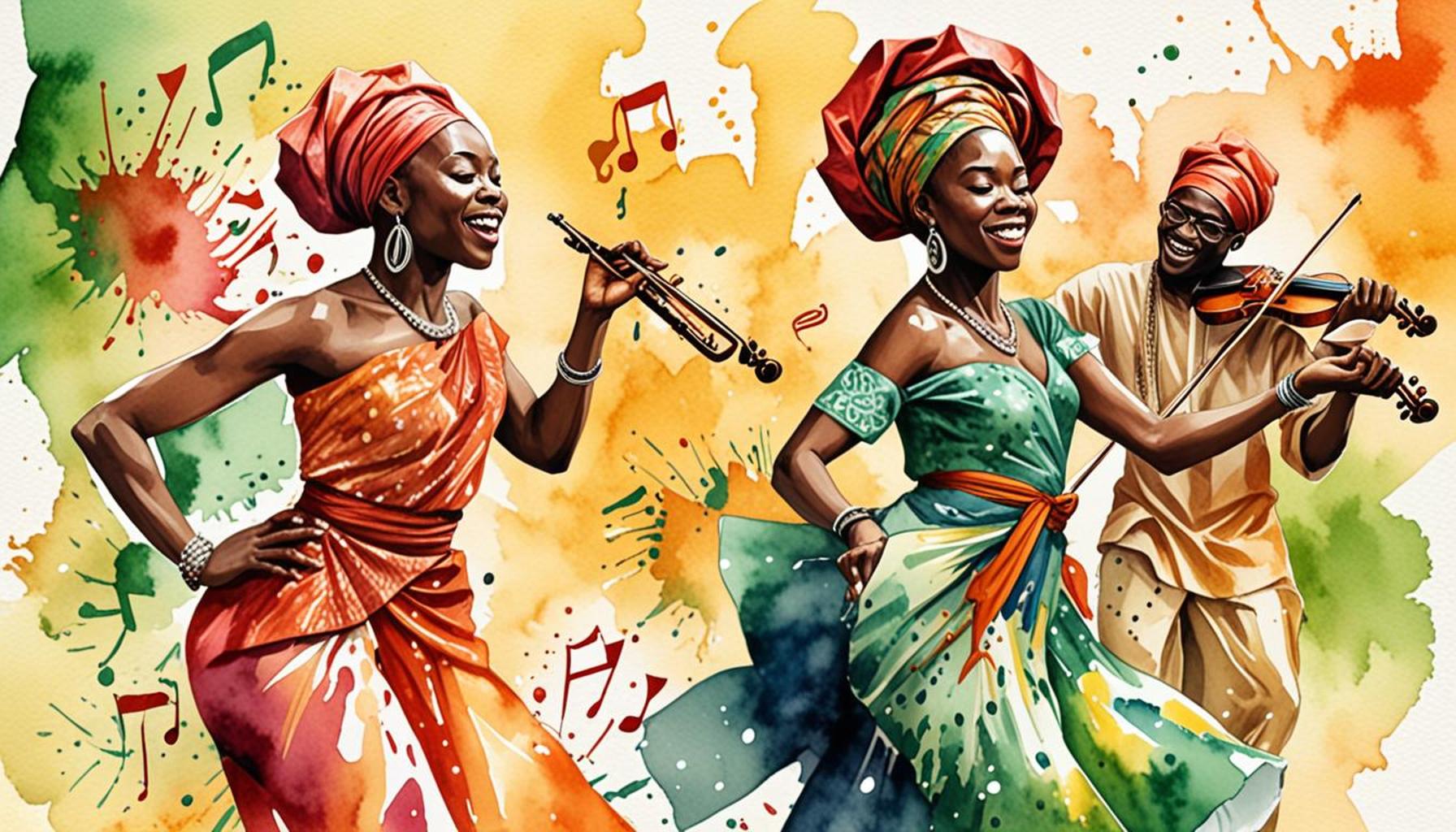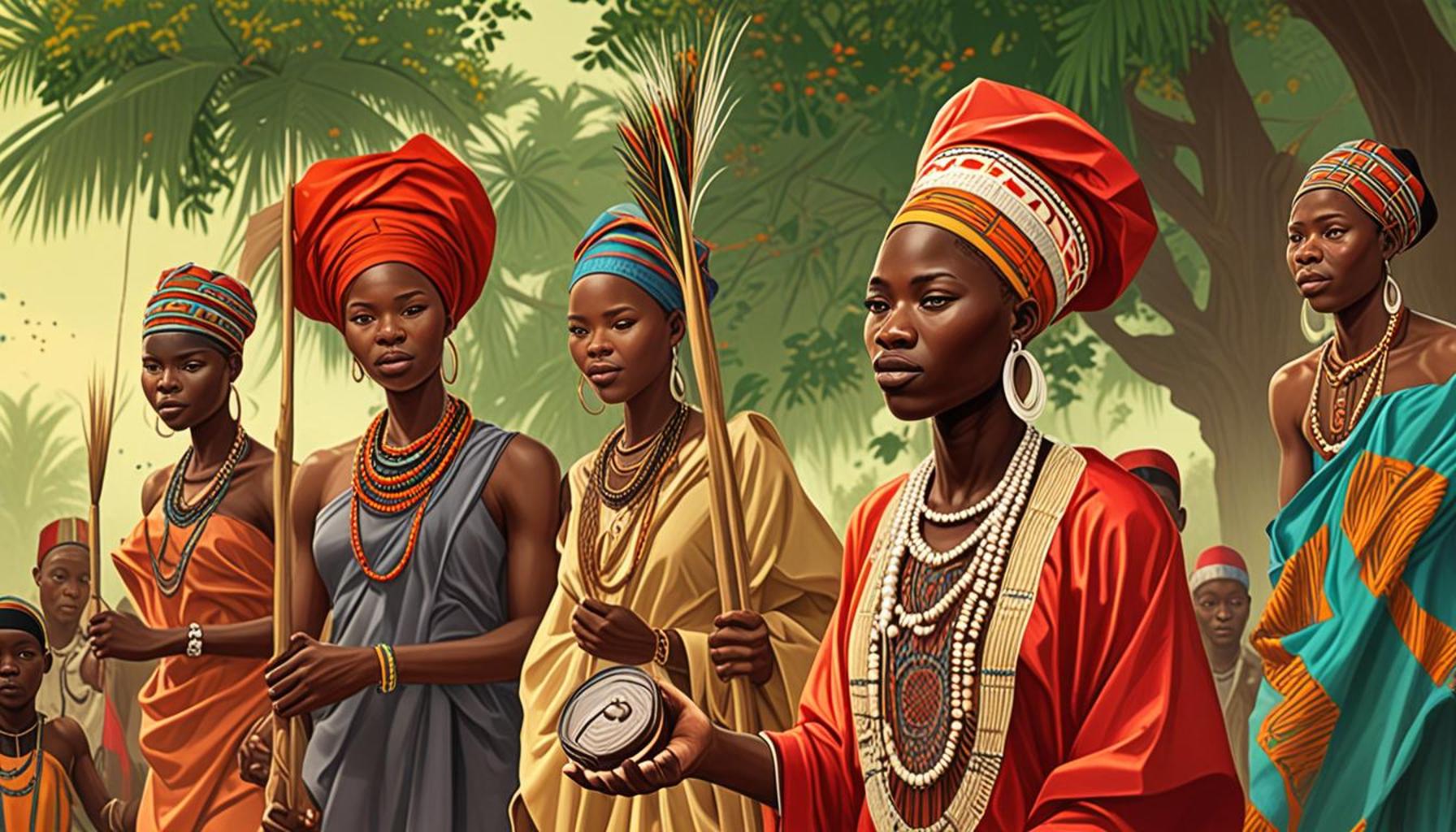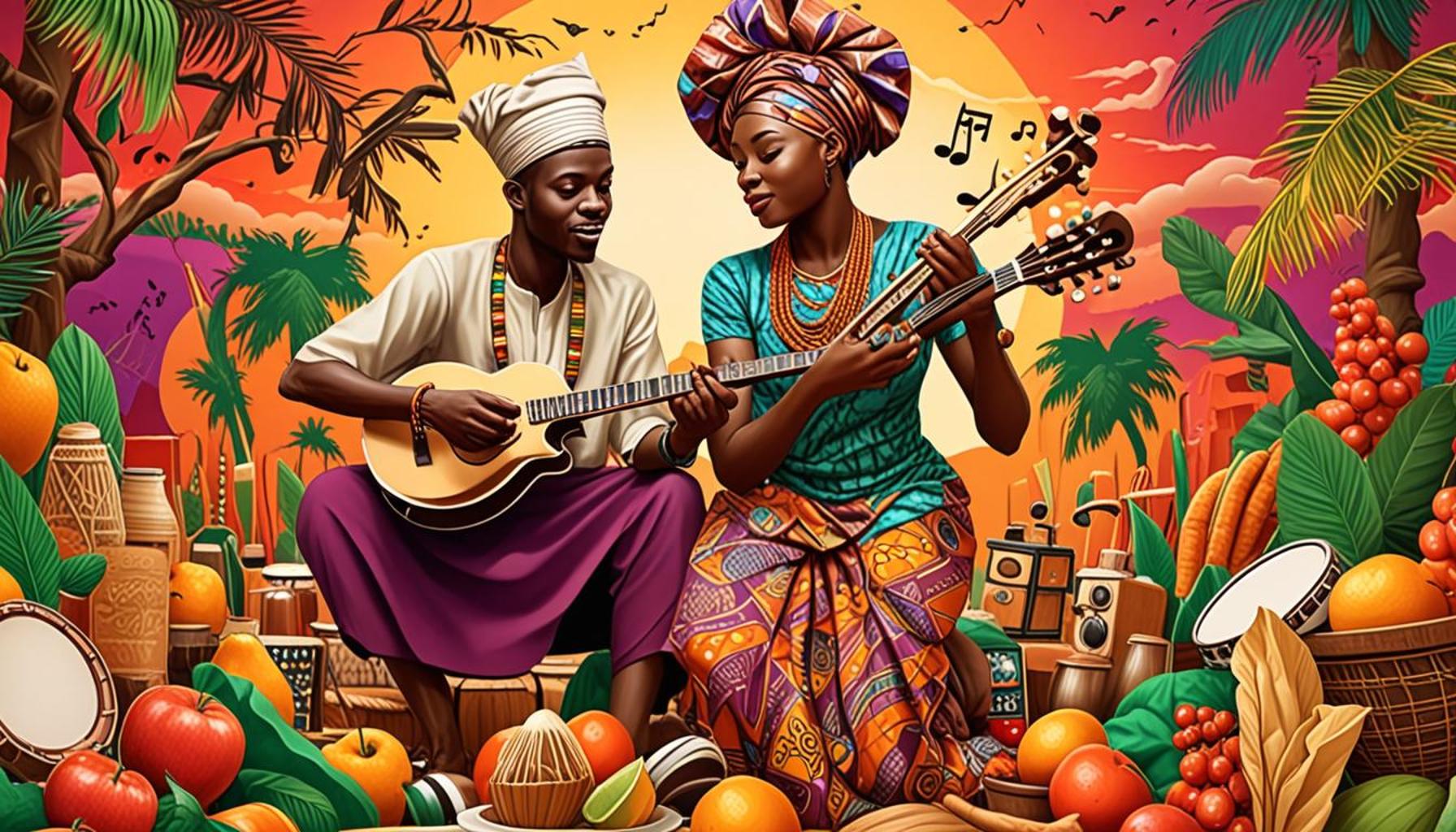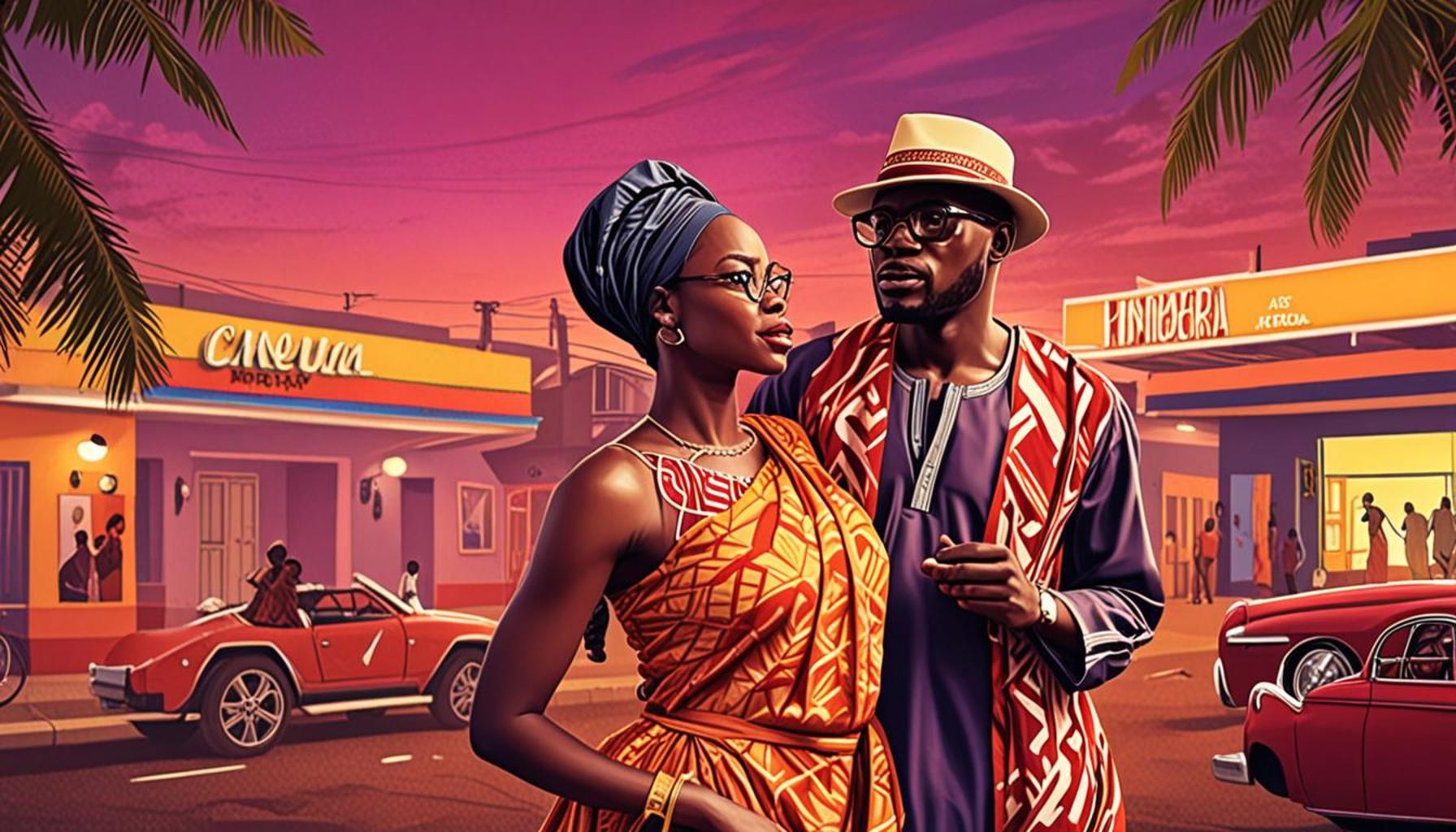Music and Dance: Cultural Itineraries that Celebrate the Richness of Nigerian Musical Traditions

The Rich Tapestry of Music and Dance in Nigeria
Nigeria’s cultural landscape is a vibrant reflection of its multifaceted heritage, with music and dance serving as powerful mediums of expression. These art forms are deeply intertwined with the nation’s identity, acting as vessels for storytelling and community bonding. They not only entertain but also preserve the traditions and histories of the diverse ethnic groups scattered across the country.
One of the hallmarks of Nigerian music is its extraordinary variety, which is largely shaped by the numerous ethnicities existing within its borders. The Yoruba, for instance, are renowned for their rhythmic drumming styles, often featuring intricate patterns that accompany traditional songs and dances like the energetic Gẹlẹdẹ. Meanwhile, the Hausa people contribute a flavor of their own through the soothing melodies of Sakara music, which utilizes a blend of acoustic instruments like the guitar and talking drum. The Igbo community adds yet another layer with its vibrant sounds of highlife, characterized by its brass sections and syncopated rhythms, which have spread beyond Nigeria’s borders, influencing musicians globally.
Instrumentation: A Fusion of Tradition and Modernism
The instrumentation in Nigerian music tells its own story of evolution. Traditional drums, such as the djembe and talking drum, form the backbone of many performances, providing not just rhythm but also a means of communication. Over time, these age-old instruments have merged with modern elements—including electronic keyboards and synthesizers—resulting in contemporary genres like Afrobeats. Artists such as Wizkid and Burna Boy exemplify this blend, using technology to amplify traditional sounds, while also reaching global audiences.
Cultural Festivals: Celebrating Heritage
Nigeria is home to rich cultural festivals that celebrate its musical traditions and bring communities together. The Calabar Carnival, often dubbed Africa’s biggest street party, showcases dazzling costumes, mesmerizing dance performances, and a multitude of musical genres, including reggae and gospel. Similarly, the Osun-Osogbo Festival honors the River Osun goddess with rituals, prayers, and vibrant traditional music, drawing thousands from across the nation and beyond. Visitors are treated to a spectacle of folk dances that chronicle ancient stories and religious beliefs.
For those looking to delve deeper into Nigeria’s musical heritage, various cultural itineraries focusing on music and dance can provide unique insights into the country’s artistic tapestry. From attending live performances in local hotspots to participating in workshops, each experience unveils the rich layers of history and creativity that shape the Nigerian identity.
In conclusion, the exploration of Nigeria’s music and dance is not just an auditory experience but an invitation to connect with the cultural pulse of the nation. Whether you are a local resident or a curious traveler, immersing yourself in these traditions offers a profound understanding of Nigeria’s past and a glimpse into its ever-evolving cultural future.
YOU MAY ALSO LIKE: Read read another article
Exploring Diverse Genres: A Journey Through Nigeria’s Musical Landscape
Nigeria’s music scene is a dynamic tapestry woven from a myriad of sounds, rhythms, and cultural influences. The depth of its musical traditions invites both locals and visitors to embark on a journey that transcends mere auditory appreciation. As one delves into the heart of Nigerian music, it becomes clear that each beat and melody carries a cultural significance, embodying the history, values, and dreams of its people.
Essential to this exploration is understanding the key genres that define Nigerian music. Here are a few notable genres that illustrate the diversity:
- Afrobeats: This contemporary genre has taken the world by storm, blending traditional African music with pop, dance, and hip-hop influences. Artists such as Davido and Yemi Alade are at the forefront, creating infectious rhythms that resonate globally.
- Highlife: Originating from the Igbo and Efik cultures, highlife music combines jazzy horns with traditional African sounds. It serves as a cornerstone of Nigerian social functions, characterized by its danceable beats and engaging lyrics.
- Fuji: A genre deeply embedded in the Yoruba culture, Fuji music is known for its energetic drumming and call-and-response singing style. Popularized by legends such as King Sunny Ade, it often accompanies social gatherings and celebrations.
- Juju: Combining elements of traditional Yoruba music, juju utilizes instruments such as the guitar, drums, and synthesizers, creating a sound that is both captivating and reflective of modern influences. This genre emphasizes storytelling, often recounting everyday experiences.
Each genre not only showcases unique musical styles but also provides insights into the local customs and lifestyles of different ethnic groups. For instance, in the northern regions dominated by the Hausa culture, music often intertwines with daily activities, reflecting social values and traditions through songs that echo the sounds of the talking drum.
Regional Variances in Music and Dance
As Nigeria spans diverse landscapes and communities, the regional variations of music and dance further enrich the national culture. Each area boasts its distinct musical characteristics, resulting in a harmonious blend of sounds across the country. In the southwest, the Yoruba people celebrate their heritage through elaborate masquerade dances, which incorporate both music and movement to convey spiritual narratives. On the other hand, the southeastern regions uphold their traditions through the vibrant Ikorodu Dance and Nkwa Ugu, which utilize traditional attire and rhythmic body movements, painting a visual and auditory portrait of their values.
Participating in these regional celebrations not only provides entertainment but also fosters a sense of community and belonging. Engaging with local musicians during festivals or community events allows visitors to appreciate the evolution of these genres and their significance in storytelling, bridging the gap between generations.
For those seeking to explore Nigeria’s musical wealth, embarking on a cultural itinerary offers an unparalleled opportunity to experience various genres. From intimate performances in local taverns to electrifying concerts in urban centers, the diversity of Nigerian music facilitates a profound connection to the country’s soul, inviting all to join in its rhythm.
| Advantages | Cultural Significance |
|---|---|
| Experiencing Rich Heritage | Cultural itineraries provide direct engagement with Nigeria’s diverse musical traditions, showcasing various genres from traditional folk songs to contemporary Afrobeat. |
| Fostering Community Connections | Participating in local music and dance showcases encourages unity and celebrates the rich tapestry of Nigerian culture among various communities. |
These itineraries not only serve as a beautiful journey through Nigeria’s vast musical landscape but also contribute to the ongoing preservation of cultural identities. From the pulsating rhythms of the talking drum to the soulful melodies of Yoruba praise singing, each experience is unique and captivating. They highlight the profound connection between music, dance, and community life, emphasizing how these elements are intertwined in Nigerian society. By immersing in this cultural exploration, travelers can gain a deeper appreciation of the artistic expressions that define Nigeria’s rich heritage while simultaneously supporting local artists and cultural practitioners. Engaging with these traditions can lead to a richer understanding of their relevance today, inspiring global audiences to celebrate the vibrancy and resilience of Nigerian musical traditions.
CHECK OUT: Click here to explore more
The Role of Festivals in Preserving Musical Heritage
In Nigeria, music and dance are not just forms of entertainment; they serve as vital components of cultural identity and communal solidarity. This is most evident during various festivals celebrated across the country, where traditional music and dance take center stage. These festivities play an integral role in preserving Nigerian musical traditions, acting as conduits for cultural expression and intergenerational knowledge transfer.
One of the most significant festivals is the Eyo Festival held in Lagos, which showcases the rich cultural heritage of the Yoruba people. Participants don elaborate costumes and perform ritualistic dances to traditional music, celebrating the spirit of their ancestors. The festival not only draws local attendees but also attracts visitors from around the globe, showcasing the unique convergence of creativity and spirituality. Through the rhythmic sounds of talking drums and melodious chants, the Eyo Festival serves as a reminder of the deep-seated values upheld by the community.
Moving to the northern regions, the Durbar Festival demonstrates the blend of music, dance, and equestrian skills. Celebrated during Eid al-Fitr and Eid al-Adha, this festival showcases elaborate parades featuring horse riders adorned in opulent attire. The accompanying music, characterized by vibrant drumming and flutes, evokes a sense of unity among the spectators. This blend of visual and auditory experiences solidifies the connection between music and the celebration of life, as it highlights the essential values of hospitality and community in Hausa culture.
Connecting Generations Through Music Workshops
In addition to festivals, music workshops across Nigeria are rapidly gaining popularity as platforms for nurturing young talent and preserving musical heritage. These vibrant spaces encourage participants to learn traditional music practices, instrument playing, and performance techniques directly from seasoned musicians. Initiatives like Lagos’ Jazz & Cultural Festival not only promote local talent but also feature masterclasses and collaborative sessions that bridge the gap between generations. Young artists have been introduced to the intricacies of highlife and juju, ensuring these genres remain alive and well in the lexicon of Nigerian music.
The relevance of music education cannot be overstated, as it empowers the younger generation to connect with their heritage while also allowing them to adapt these traditions to contemporary contexts. Programs that incorporate traditional styles with modern influences, such as Afrobeats, foster an environment of creativity, stimulating both skill development and cultural pride.
Moreover, community-led projects such as the National Arts Theatre in Lagos offer a platform for emerging talents to showcase their skills, drawing attention to the universal appeal of Nigerian music. By participating in cultural itineraries that highlight these workshops and performances, visitors gain insight into the rich history of Nigerian music, forging a deeper bond with the nation’s cultural fabric.
Engaging with local communities during these events enhances the overall experience, allowing visitors to witness firsthand the passion and dedication surrounding Nigeria’s musical heritage. Each interaction—whether through participating in a lively dance workshop or listening to age-old melodies—contributes to a profound appreciation of Nigeria’s diverse musical landscape.
ADDITIONAL INSIGHTS: Expand your understanding here
Conclusion: The Living Tapestry of Nigerian Music and Dance
In conclusion, the intricate relationship between music and dance has cemented itself as a cornerstone of Nigerian cultural identity, creating rich tapestries of tradition that resonate across the nation’s diverse regions. Festivals such as the Eyo Festival and Durbar Festival serve not just as celebratory events but as vital custodians of history, allowing communities to honor their ancestors while showcasing their unique artistic expressions. These events embody the spirit of solidarity and unity among Nigerians, captivating both locals and visitors alike.
Moreover, the advocacy for music education through workshops has emerged as an effective means of connecting the younger generation with their heritage. By learning from seasoned musicians, the youth are empowered to embrace traditional styles while infusing them with contemporary influences. This fosters an environment where creativity can thrive and Nigerian musical traditions remain relevant and vibrant.
As the world becomes increasingly interconnected, the cultural itineraries that highlight Nigeria’s musical and dance traditions offer an invitation to explore the nation’s rich heritage. Whether through immersive participation in workshops, lively festival atmospheres, or intimate gatherings, each experience deepens appreciation for the artistry that lies at the heart of Nigerian culture. This continuous celebration and revitalization of music and dance ensure that these traditions thrive and evolve, making them an indelible part of Nigeria’s identity for generations to come. Thus, engaging with Nigerian music is not merely an artistic endeavor; it is a journey through the incredible landscape of human connection and cultural legacy, waiting to be explored.


